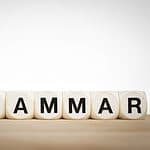How To Quickly Learn Declensions and Conjugations And Other Grammatical Abominations

I’m definitely a weirdo. I enjoy learning grammar! Declensions, conjugations, possessive pronouns.
I love them all! And there is a good reason for that! They are simply one of the easiest things to learn in most languages!
Of course, let’s be perfectly honest – learning them is easy. However, using them without any hesitation is another story. Here are a few methods you might use to learn grammar effectively:
The Classical Method
Repeat everything till your eyes and brain start bleeding. Not interested? Read on!
Look For Patterns
Let’s play Sherlock Holmes for one moment. The first thing I do when I learn grammar of some language is establishing some patterns.
For example, take a look at the weak declension of adjectives in German (it is used when there is a preceding definite article (“der-word”).
And the rest of this table is just “e”! Quite simple to remember, isn’t it?
The Four German Cases
Can’t remember the order of German cases? Maybe if I NAG(ge)D you would! 🙂
2. Create Some Stories
Example 1 – German possessive pronouns.
Here you have a list of German possessive pronouns. It looks pretty random, right? Nope, there is actually some cool story hidden there!

Now our little story can go like this:
As you can see, this method doesn’t always cover the pronunciation in 100%.
But that’s alright. In most cases, your brain is aware of that and can correct these mistakes.
Example 2 – Swedish objective pronouns
What about some (singular) objective pronouns? When I was learning Swedish I memorized them, more or less, like this:
MAYDAY! HOE NO! I wanted HENNE(ssy) .
There are so many ways to memorize these conjugations! But of course, they depend on many things – your native tongue, other languages you speak and your entire “database” of different names, notions, etc.
Being Polish, I would choose to memorize the first three endings with a word “OAZA” (eng. oasis). I think that this approximation is good enough. AMOS can be easily (for me!) associated with my beloved artist Tori AMOS who puts AIS on AN(t).
Something To Remember
Treat this method as crutches. It helps you to unburden your memory by memorizing grammar in an effortless way but it’s not a substitute for practice. You need to use the language to automate the use of grammar,
Quick FAQ
Q: Can you always find some associations?
A: Yep. Just use your imagination!
Q: But what if it doesn’t work?
A: Then try harder! Rome wasn’t built in a day.
Good luck and let me know what you think about this method!















1. 2. 3. 4.
deR die daS diE
— o
deS der deS deR
—–
deM der deM deN
— a
deN die daS diE
1 RoSMaN
2 —– = lustro
3 SSMS
4 lERNE
Mysle, ze wciaz niezle widac o co chodzi. Dziekuje za komentarz!:)
I also created funny unusual stories (for examples, about trolls) while I was learning Finnish declantions and conjugations. If you are familiar somehow with the number of that, you can suppose that there were very long stories 😀
I can imagine how long they were! It’s fun though, isn’t it?! 🙂
I am trying to say that learning poems or vocab about something irrelevant to my life, I want to flow with what I know as well as I can. Focus and trying to make cheat sheets re work, family, recent past etc. That is the kind of info I am looking for. Needy? Why not hack a language for a lift-off so one can move on from that?
I love your site! I was hoping for a good solid 2 month “hack” of Hungarian language for my interview for citizenship (through blood of my grandparents)
Koszi! 🙂
“Hack” for Hungarian language?! Aren’t you a bit needy my friend ?! 😀 Anyway, I’m sure you will nail your exam! Best of luck and thank you for your amazing comment! 🙂
I believe this site holds some very superb information for everyone : D.
Thanks a lot. I hope you find something useful here 😀
Great post! Thanks for the methods.
Again, I’m still skeptical! I want to admire the language for what it has to offer and I don’t want to break it down to my sense
One doesn’t exclude another! 🙂 For me, the quicker I learn, the faster I can start appreciating the variety of a given language 🙂
Though I am not a grammar buff but certainly I would like to learn English grammar.
You can use these techniques to learn grammar of any language! 🙂 Good luck!